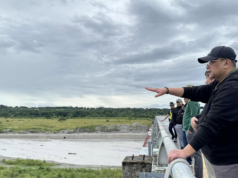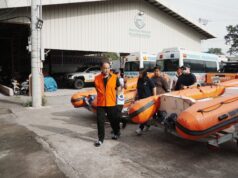PROFITABLE JOB. Fidel David (left) shows to Roy Imperial his cherry tomato seedlings which the civil engineer-turned-farmer will promulgate at his farm in San Matias, Sta. Rita, Pampanga. Photo by Joey Pavia
(First of a two-part series)
STA. RITA, Pampanga – Fidel David is a civil engineer who worked for six years in Saudi Arabia but decided to go back here for good in 1992.
He was a project engineer in the Middle East country and based on his profession, it is needless to point out that his salary was substantial.
But there was something else David had wanted to do: agricultural farming in his native barangay in San Matias, here.
“When I started farming, my main focus was to get very rich,” said David who was interviewed on Monday at his Kubo in his 3.2-hectare farm.
“But later I realized that it’s not only my stomach that gets hungry that I must feed. Others have to eat, too,” added David in the dialect.
DOCTOR AND TEACHER
David is fondly called “the doctor” by his fellow farmers, most of whom belong to the Bangon San Matias Multi-Purpose Cooperative (BSMMPC). The cooperative was started in 2004.
“I am sort of a doctor. I recommend to farmers on how to make a better yield or save their plants when they are in trouble or dying,” said David.
But David said he is more of a teacher based on what he does to promote organic and responsible farming.
For over eight years since he formed and chaired the BSMMPC, David has taught other farmers about the new agricultural techniques and studies based on his actual experiences and experiments on his farmland.
David is teaching them for free. Not to mention he does it with passion and dedication in order to let aspiring and veteran farmers realize that “farming is where the money is.”
“Life is too short. Why not share what you know so that others may succeed as well,” stressed David.
He established a demo farm and agricultural school on his property a few years ago. It initially received little support from government agencies and agricultural schools.
But of late, the Department of Agriculture (DA) and schools such as the Pampanga Agricultural College (PAC) visited his farm to study or ask about his latest research and techniques on farming.
Other farmers’ groups in Central Luzon also see him to study and bring home some knowledge to improve their farming practice.
David disclosed that at least P150,000 worth of equipment are in their school and are used for continuous study.
He also helps other prominent farmland owners and businessmen in developing their vegetable products. Yes, David doesn’t charge the rich as long as they are willing to invest in organic farming.
“I even spend on my gasoline just to visit their huge farms. I don’t ask for pay because I want to promote farming, particularly the safe practice,” he added.
David’s Kubo is overlooking his newly harvested palay and newly planted watermelons.
He cited “timing” as important in order for farmers to earn well and get over climate change without much damage to their crops and vegetables.
“As you know, the rains will be in late May or June. So I planted watermelons which are harvestable after about 65 days or in late May,” said David. He said he will spend about P10,000 for the .3-hectare watermelon plantation but he expects to earn at least P60,000.
“That’s my point in timing. Our farmers should simply learn what to plant on a particular season and they will get much profit,” said David.
The 47-year-old civil engineer-turned-farmer disclosed that farming had been more profitable to him than working as an overseas Filipino worker (OFW).
He said he was in high position in Saudi Arabia for six years but had failed to buy a vehicle like the jeep he is using now.
“I could send my only daughter to school and raise a decent family with my earning as a farmer. That’s enough for me,” he added.
NURTURE THE SOIL
David is widely known among Pampanga farmers as “advocate of responsible and organic farming.”
He said some farmers have a bad habit of using chemicals “most of the time” to make a better yield. This practice, he added, doesn’t nurture the soil but destroys it.
“Worse, the old saying that eating vegetables makes you live longer is no longer true. Some vegetables are borne out of too much chemical fertilizers and pesticides and this is unhealthy and dangerous,” he said.
David said a farmer is not expected to use 100 percent organic fertilizers when he decides to let go of chemicals. He added that he started by using 50 percent chemicals and 50 percent organic fertilizers.
Today, David uses at least 70 percent organic fertilizers on his plants. Most of the organic materials are made in his farm.
Roy Imperial, former director of the DA’s High Value Commercial Crops, visited David at his farm upon the instruction of Pampanga Gov. Lilia Pineda to find a better future for some 33,000 farmers in the province. He is now the consultant-adviser of Pineda.
To be continued




